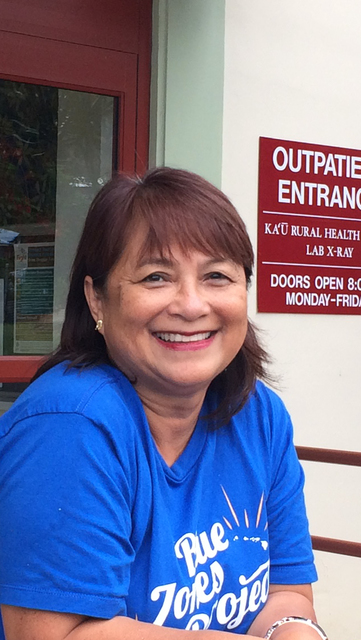Donna Kekoa of Pahala has graduated from a pilot program designed to soften the shortage of medical providers. ADVERTISING Donna Kekoa of Pahala has graduated from a pilot program designed to soften the shortage of medical providers. The newly minted
Donna Kekoa of Pahala has graduated from a pilot program designed to soften the shortage of medical providers.
The newly minted “community health worker” is one of nine who graduated Thursday via the Ka‘u Rural Health Community Association.
The students were trained through a “place-based” distance-learning program that allowed them to complete training, avoid leaving home for a college campus and, instead, stay connected with community and family.
Community health workers are “people in the community that can help the health care provider connect with (patients) and help them understand their health care program, or their disease,” said Auntie Jessie Marques, executive director and program director of the association.
All of the students expect to undertake six-month internships focused on patient interaction. Kekoa’s likely will be at the community hospital, where she already works as a front desk clerk. The courses helped broaden her medical vocabulary when interacting with patients and health providers.
“What I used to have was just a little dictionary,” she said, “and I just looked up words.”
Now, she has studied many topics, including medical terminology, anatomy, physiology and geriatrics.
“It just really opened a door. Like, ‘Wow!’” she said.
Sunshine Kahapea also graduates today.
“I’ve become more connected to my community, and what I feel like I can give back to the community,” Kahepea said.
Organizers say one of the rural program’s triggers was the Affordable Care Act that connected millions of Americans nationally with health insurance they did not have before.
“This change in (teaching) approach is motivated by existing shortages in the primary medical care workforce and the expected increase in demand for care associated with expanded insurance coverage under the Affordable Care Act,” Marques said.
Kahapea said she hopes to serve elderly patients and is excited for her internship to start at the Yukio Okutsu State Veterans Home in Hilo. She also hopes to help community members in Volcano access health education and connect with doctors.
Community health workers honed their skills to help bridge language and cultural barriers so accurate medical and social information can be shared between health providers and patients and vice versa. Elderly patients, in particular, have been a focus of the education.
“One day, I’m going to be on the other side of the counter that I work,” Kekoa said, “so you just give a little more of your heart to them.”
If she doesn’t know the answer to a patient’s question, Kekoa said, she has the knowledge, now, to help her find the answer.
“Sometimes, they don’t want to tell the doctor things and sometimes I can tell the doctor and interpret,” she said.
When serving patients, she considers compassion for her own mother.
“I always think about her and I want her to have someone with a caring heart to take care of her,” she said, adding that “Completing the course is a milestone, but the greatest achievement is when you made a difference in someone else’s life sharing your knowledge of what I have learned and knowing in your heart that a community member has changed his or her lifestyles making better choices to live a healthier life. That is the highest reward any one can receive because it was done by a giving heart of passion and caring.”
Email Jeff Hansel at jhansel@hawaiitribune-herald.com.



